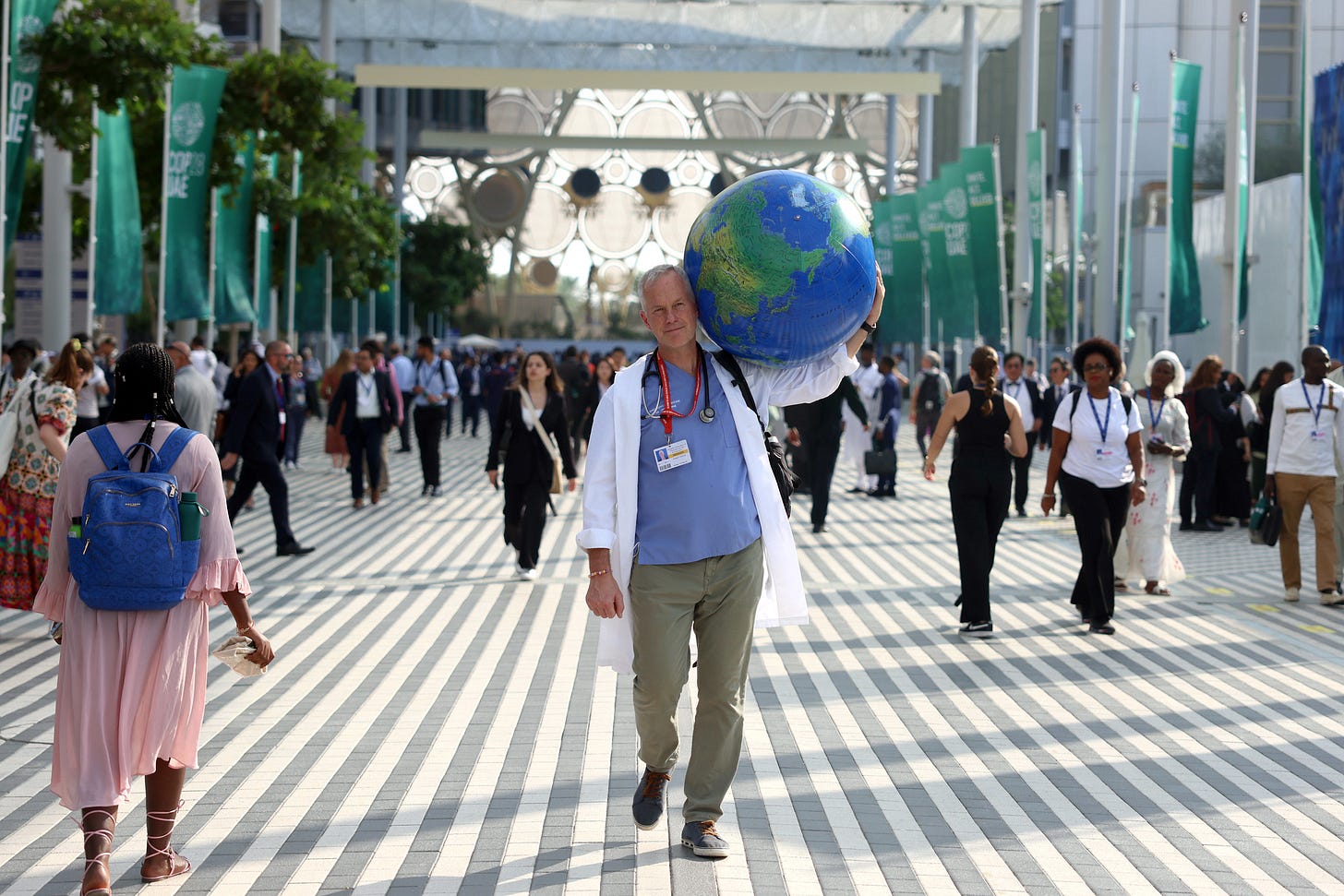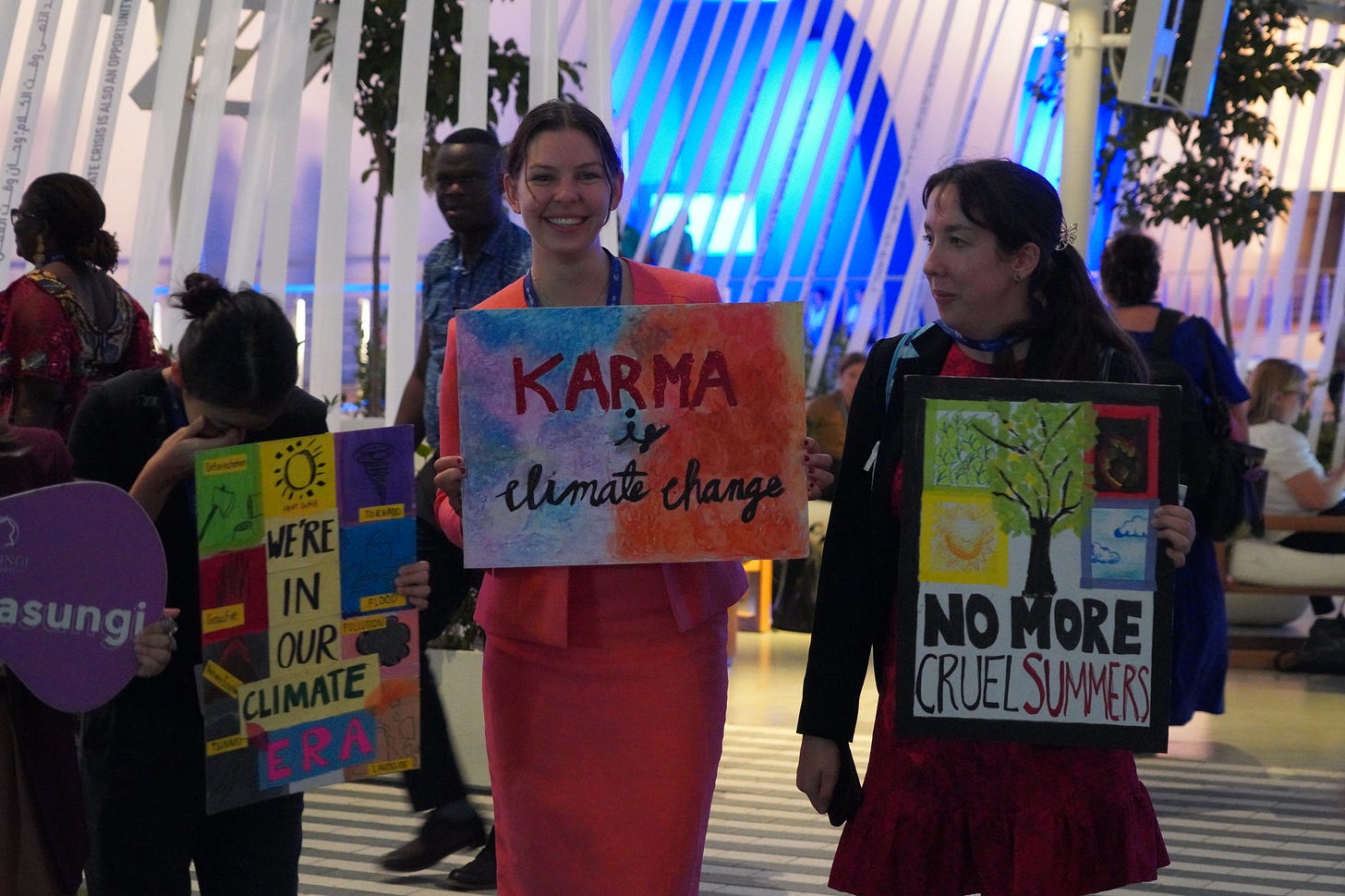4 December 2023. Technology | Climate
Reclaiming the history of technology. // Why COP28 matters. [#521]
Welcome to Just Two Things, which I try to publish three days a week. Some links may also appear on my blog from time to time. Links to the main articles are in cross-heads as well as the story. A reminder that if you don’t see Just Two Things in your inbox, it might have been routed to your spam filter. Comments are open.
1: Reclaiming the history of technology
Arthur Clarke once said that any sufficiently advanced technology is indistinguishable from magic, but the dominant technology at any given time also has another magic property: criticism or dissent just bounces off it, flows past it, never sticks.
Once of the ways we know that a dominant technology is losing its dominance is that the critics start to mass and the criticism starts to stick. And that’s where we are right now with digital technologies.
So this week in Just Two Things I’m going to have a mini-series of pieces in which people critique digital technologies in recent articles. First up: Brian Merchant, whose book Blood in the Machine seeks to rehabilitate the Luddites as part of his critique.
Of course, the Luddites are the most misunderstood group in the history of technology. They were cloth workers who wrecked the machines that were putting them out of work, and they have been (mis)represented ever since as people opposed to technological progress, generally by those who benefit from it. But Luddism was actually a moral technology, about the social relations that were being constructed by the new machines. For these reasons, Merchant sees them as a metaphor for our times: He writes that ‘It was an uprising not against progress but “against the first tech titans.”’
(1812 poster showing Ned Ludd, the fictitious ‘Leader of the Luddites.’ Wikimedia Commons, CC BY-SA)
Anyway, the Bulletin of Atomic Scientists interviewed Merchant about his book, and I think that among the pieces I have seen this is the best way into his argument. The interview is by Sara Goudarzi.
BM: There are a few cases like Richard Arkwright who started his operation and found such wild success that it drove others to emulate his models of factorization... Then his son took over, expanded the empire, and became the wealthiest common-born person in all of England, and that wealth did persist.... Once people saw successful entrepreneurs use that model, more started founding their businesses that way—with less regard for norms and standards or communities and more for maximizing profits.
Merchant also draws attention to the importance of politics in enabling the growth of the factory system. It was not universally popular even among the elites, but the then Prime Minister, Pitt the Younger, was an enthusiastic proponent. There are similarities with the current generations of wealthy industrialists:
For example, in a Tesla factory or an Amazon warehouse they’re relentlessly dividing labor to produce a futuristic electric car or to get products from a warehouse arranged and out the door as fast as possible. In principle, it’s not that much different than the factories of Richard Arkwright. He amassed his wealth through old fashioned labor exploitation and children working in his factories.
In the interview Merchant asks, completely rhetorically, whether it’s coincidence that at a time when power and wealth have concentrated so much that we’re also seeing social protections break down in the US. He thinks it’s not.
But there’s an important difference between the Arkwrights of the 18th century and the digital companies of the 21st century. Arkwright had to sell actual goods to an actual market, whereas—say—Uber just had to sell an idea of a potential market to a group of venture capitalists:
It just got a war chest of venture capital. It plowed through city after city and got to ignore those pleas and entreaties from officials, because it just was so big. Soon it was too big to fail, and people liked it. Ten years later, we see the effect of that: We see how it has driven down wages for cab drivers, made medallions worthless, and driven lots of people to despair... Then on the other side, it’s ticked down the pay rates for drivers who are struggling and have been for years.
Merchant is the Los Angeles Times’ technology correspondent, and as should be clear from the extracts above, he’s interested in the social and political effects of technologies, and the power that is exercised around them. This is why he is interested in the Luddites, because Luddism was a critique of power:
SG: The Luddites... weren’t worried that machines would become too powerful, but that the machines would be used against them, to rob them of their agency, and to degrade them. Why is it important that we understand this so many years later?
BM: It really serves the interests of those who benefit from not having a lot of questions asked about how they’re developing, deploying, or making a lot of money off technology, to call anyone who might question or resist certain parts of it backwards-looking, Luddites... The Luddites did lose their battle; they were crushed by the state. Then, the victors got to write the history books. But I think it’s so important right now that we say the Luddites weren’t wrong. They didn’t hate technology. If anything, they can teach us that there are so many more ways that we might go about developing technology, ensuring that the gains are more evenly distributed and that more people benefit from it.
I’ve touched very lightly on the interview here, but there are a couple of other strands that are worth mentioning. The first is that the social questions that the Luddites were asking can point us towards other ways of shaping technologies for social and public benefit. The financialised version we currently have of doing this is not inevitable, and it’s not the only model.
(Source: Brian Merchant, via @brianmerchant@mastodon.social)
The other point is the way in which the cultural figures of the day spoke for the Luddites. (See also Ted Gioia’s recent piece on this). Lord Byron made a speech in the British House of Lords. Shelley sent money to the families of Luddites who were hanged for machine-wrecking. And the thread here extends to Shelley’s wife, Mary Godwin, whose book Frankenstein is the first great novel of the technology age:
SG: You wrote that “If the Luddites have taught us anything, it’s that robots aren’t taking our jobs. Our bosses are. Robots are not sentient—they do not have the capacity to be coming for or stealing or killing or threatening to take away our jobs. Management does. Consulting firms and corporate leadership do. Gig company and tech executives do.” So why is the narrative of the robots are coming for our jobs continually repeated in the media and popular culture?
BM: Mary Shelley came up with Frankenstein to be a vehicle for all the concerns of the underclass being trampled by reckless innovators and industrialists, and it became this story of runaway dangerous technology over the years. It became that Frankenstein’s monster is just something that was created and that we can’t control anymore. A lot of the class politics involved were whittled away... Every time that a robot takes a job, there’s a decision being made by a human to have the robot take that job. It’s bosses and managers who are choosing where to deploy the technology and where to eliminate jobs. So, like the propagation of the Luddite myth itself, it removes the onus from management, executives, and companies.
As for protesting, Merchant reckons that the biggest defence against those human decisions about jobs and robots is trades unions: don’t mourn, organise, as the saying goes. But he’s also a fan of guerilla resistance, such as the San Francisco activists using traffic cones to immobilise self-driving vehicles.
If you want a more conventional review, Dave Karpf did one in his newsletter.
2: Why COP28 matters
It’s COP28, and many of the pre-event reports focused on the role of fossil fuel companies and that ethics-free zone McKinsey to water down our existing agreements under the Paris Accord. It happens that one of the architects of the Paris agreements Peter Ebbs, died recently, so it seems a good moment to mention an unusually personal account by James Murry, the editors of Business Green, on why COP28 matters. It’s currently outside of their paywall.
To get the full flavour of this, I recommend going to the original. But I’ll do what I can here. He starts with a moment from his backpacking days, travelling in the Australian outback with a typical international backpacker group:
The stars look like they have been painted on an infinite backdrop and the crackling of the fire and the chatter of young people is the only noise. The conversation drifts towards politics and fear. September 11th was just a few months ago... The 'long 90s' of idealism, hedonism, and relative peace is on its death bed, where it will remain until the financial crash of 2008 administers the final rites. Everyone is rightly worried about what comes next. A cycle of vengeance and pain is about to spin out of control.
(Photo by United Nations Framework Convention on Climate Change (UNFCCC)/flickr. CC BY-NC-SA 2.0)
In some ways, this is the right place to start, since many of the tensions that make it so hard to act globally against climate change started there. But you can go back further, to the late ‘70s and early ‘80s, when we could have started moving away from fossil fuels and aggressive consumerism, but decided instead to ramp it up.
Murray suggests that we are at our most dangerous point since the 1980s, because of the fissile state of our geopolitics:
(S)easoned historians talk of the conditions being in place for a great power conflict. Numerous low level proxy wars have been simmering away for much of the past decade. But now two major conflicts have erupted that combine ancient territorial claims, medieval brutality, 19th century geopolitical manoeuvring, and 21st century digital propaganda. As the former soldier and writer Mike Martin observed as Russia's invasion of Ukraine intensified: "This is how global wars start, right? Wars begat wars".
All of this is unfolding against a backdrop of climate disaster. Why you think this is depends on how you see the world, but multiple explanations can all be true at the same time. It could be a process of extraction that has exploitation and colonialism at its root. It could be that an over-populated world is watching a reply of the 19th century Great Game, when the ‘great powers’ played ‘Diplomacy’, but for real, to secure resources. Murray doesn’t use the word, but the current crisis could well be overdetermined:
When the first quarter of the 21st century is assessed, the overarching meta-narrative will surely be the spiralling upwards of global temperatures, the physical impacts on the biosphere that have come with that warming, and humanity's deeply flawed response to it. The rise of China, the muscle-flexing adventurism of the petrostates, the economic slowdown of the Global North, the decline of democracy and the march of populism - all this will feature in the history books, but each of these trends are sparked or shaped by ecosystem collapse, gathering climate-induced migration, food price instability, and the start of the world-historic transition away from fossil fuels.
And as Murray says: every crisis that governments are wrestling with at the moment has a climate angle. And every one is either exacerbated or caused by our dependence on fossil fuels. And one of the undertones of this is that everything has a climate perspective—as he notes, even Disney’s latest film, Elemental, has a climate sub-plot.
Applying a climate lens improves every policy and instils greater optimism and better returns in every project. Climate action is the only viable path out of these dangerous decades. Thankfully, since the Paris Agreement was signed this hypothesis has become an increasingly influential economic consensus. There is a widespread acceptance that clean technology delivers cheaper energy, increasingly equitable economic prosperity, and better living standards.
(Photo by United Nations Framework Convention on Climate Change (UNFCCC)/flickr. CC BY-NC-SA 2.0)
That widespread acceptance includes the current US Administration, the EU and the UK, and China. And climate informs almost every policy choice we have. He mentions housing, for example:
If you are going to build more homes, you want those homes to be ultra-efficient, clean tech adorned, climate resilient, and located in walkable communities. Then you get not just economic growth, but also lower energy bills, enhanced energy security, improved health, reduced risks, lower insurance premiums, less atomised communities, greater entrepreneurialism, and lower emissions. Why would you not do this?
The same is true in every sector:
Greener is better, more efficient, more secure, and comes with more co-benefits. The capital costs can be higher, but that is only because of the market failure of under-priced pollution, and besides the running costs are invariably lower and the multiplier effects are greater. The net zero transition is Keynsianism for the 21st century.
If it’s so obvious, why aren’t we there already? We know that increasing numbers of politicians and business leaders get it. But the transition is a nightmare:
How to ensure that the clean energy revolution accelerates at sufficient pace that fossil fuel demand can fall both rapidly and in lockstep with constrained supply... How to marginalise the climate sceptics and convince the polluting vested interests that their risk analysis is wrong and their short termism is going to destroy everything.
This, says Murray, is why COP28 matters so much:
At a time when too many countries are at each others' throats, when great powers jostle for primacy and their proxies unleash horrors, this is a peace summit. It is a mechanism for multilateralism and the recognition of both shared humanity and aligned self-interest. It is a forum that seeks to tap the qualities we all try to teach the next generation, and yet too easily let slip: patience, empathy, responsibility, perseverance, resilience, trust, respect, kindness.
(Photo by United Nations Framework Convention on Climate Change (UNFCCC)/flickr. CC BY-NC-SA 2.0)
Not that any one is going to talk in such idealistic terms in public, or even in private. But: there is a deal to be done at COP that can create a virtuous cycle of positive change. I’ve broken this section up so the steps are easier to see:
A deal that would set new clean tech deployment goals that would empower governments as they look to turbocharge already record green investment.
That would deliver the long overdue reforms that can unleash flows of climate finance into the developing economies that need it most.
That would provide funding for climate-related loss and damage from industrialised and emerging economies alike.
That would give businesses and investors the confidence they need to face down current economic headwinds and unleash a new wave of green investment and innovation.
That would see all countries publicly recognise that regardless of whether they are 'phased out' or 'phased down', the fossil fuel era is drawing to its close.
Because, as if we need to be reminded: the clock is ticking and the bus is still travelling too fast. If there isn’t a deal, we’re all going to be in the world of Speed—but (spoiler!) without the happy ending.
Thanks to Ian Christie for the link.
j2t#521
If you are enjoying Just Two Things, please do send it on to a friend or colleague.








